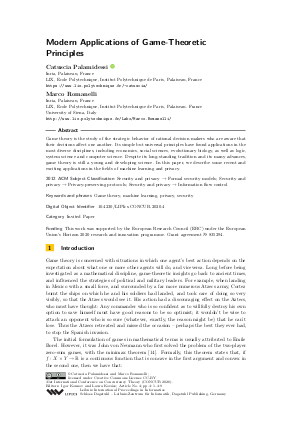Modern Applications of Game-Theoretic Principles (Invited Paper)
Authors
Catuscia Palamidessi  ,
Marco Romanelli
,
Marco Romanelli
-
Part of:
Volume:
31st International Conference on Concurrency Theory (CONCUR 2020)
Part of: Series: Leibniz International Proceedings in Informatics (LIPIcs)
Part of: Conference: International Conference on Concurrency Theory (CONCUR) - License:
 Creative Commons Attribution 3.0 Unported license
Creative Commons Attribution 3.0 Unported license
- Publication Date: 2020-08-26
File

PDF
LIPIcs.CONCUR.2020.4.pdf
- Filesize: 22.15 MB
- 9 pages
Document Identifiers
Subject Classification
ACM Subject Classification
- Security and privacy → Formal security models
- Security and privacy → Privacy-preserving protocols
- Security and privacy → Information flow control
Keywords
- Game theory
- machine learning
- privacy
- security
Metrics
- Access Statistics
-
Total Accesses (updated on a weekly basis)
0Document
0Metadata
Abstract
Game theory is the study of the strategic behavior of rational decision makers who are aware that their decisions affect one another. Its simple but universal principles have found applications in the most diverse disciplines, including economics, social sciences, evolutionary biology, as well as logic, system science and computer science. Despite its long-standing tradition and its many advances, game theory is still a young and developing science. In this paper, we describe some recent and exciting applications in the fields of machine learning and privacy.
Cite As Get BibTex
Catuscia Palamidessi and Marco Romanelli. Modern Applications of Game-Theoretic Principles (Invited Paper). In 31st International Conference on Concurrency Theory (CONCUR 2020). Leibniz International Proceedings in Informatics (LIPIcs), Volume 171, pp. 4:1-4:9, Schloss Dagstuhl – Leibniz-Zentrum für Informatik (2020)
https://doi.org/10.4230/LIPIcs.CONCUR.2020.4
BibTex
@InProceedings{palamidessi_et_al:LIPIcs.CONCUR.2020.4,
author = {Palamidessi, Catuscia and Romanelli, Marco},
title = {{Modern Applications of Game-Theoretic Principles}},
booktitle = {31st International Conference on Concurrency Theory (CONCUR 2020)},
pages = {4:1--4:9},
series = {Leibniz International Proceedings in Informatics (LIPIcs)},
ISBN = {978-3-95977-160-3},
ISSN = {1868-8969},
year = {2020},
volume = {171},
editor = {Konnov, Igor and Kov\'{a}cs, Laura},
publisher = {Schloss Dagstuhl -- Leibniz-Zentrum f{\"u}r Informatik},
address = {Dagstuhl, Germany},
URL = {https://drops.dagstuhl.de/entities/document/10.4230/LIPIcs.CONCUR.2020.4},
URN = {urn:nbn:de:0030-drops-128167},
doi = {10.4230/LIPIcs.CONCUR.2020.4},
annote = {Keywords: Game theory, machine learning, privacy, security}
}
Author Details
- Inria, Palaiseau, France
- LIX, Ecole Polytechnique, Institut Polytechnique de Paris, Palaiseau, France
Funding
This work was supported by the European Research Council (ERC) under the European Union’s Horizon 2020 research and innovation programme. Grant agreement № 835294.
References
- Martín Abadi and David G. Andersen. Learning to protect communications with adversarial neural cryptography. CoRR, abs/1610.06918, 2016. URL: http://arxiv.org/abs/1610.06918.
-
Samson Abramsky, Dan R. Ghica, Andrzej S. Murawski, and C. H. Luke Ong. Applying game semantics to compositional software modeling and verification. In Kurt Jensen and Andreas Podelski, editors, Tools and Algorithms for the Construction and Analysis of Systems, pages 421-435, Berlin, Heidelberg, 2004. Springer Berlin Heidelberg.

- Samson Abramsky, Radha Jagadeesan, and Pasquale Malacaria. Full abstraction for PCF. Information and Computation, 163(2):409-470, 2000. URL: https://doi.org/10.1006/inco.2000.2930.
- Miguel E. Andrés, Nicolás E. Bordenabe, Konstantinos Chatzikokolakis, and Catuscia Palamidessi. Geo-indistinguishability: differential privacy for location-based systems. In Proceedings of the 20th ACM Conference on Computer and Communications Security (CCS 2013), pages 901-914. ACM, 2013. URL: https://doi.org/10.1145/2508859.2516735.
-
Andreas Blass. A game semantics for linear logic. Annals of Pure and Applied Logic, 56(1-3):183-220, 29 April 1992.

-
Nicolás E. Bordenabe, Konstantinos Chatzikokolakis, and Catuscia Palamidessi. Optimal geo-indistinguishable mechanisms for location privacy. In Proceedings of the 21th ACM Conference on Computer and Communications Security (CCS 2014), 2014.

- Matt Fredrikson, Somesh Jha, and Thomas Ristenpart. Model inversion attacks that exploit confidence information and basic countermeasures. In Proceedings of the 22Nd ACM SIGSAC Conference on Computer and Communications Security, CCS '15, pages 1322-1333, New York, NY, USA, 2015. ACM. URL: https://doi.org/10.1145/2810103.2813677.
- Ian Goodfellow, Jean Pouget-Abadie, Mehdi Mirza, Bing Xu, David Warde-Farley, Sherjil Ozair, Aaron Courville, and Yoshua Bengio. Generative adversarial nets. In Z. Ghahramani, M. Welling, C. Cortes, N. D. Lawrence, and K. Q. Weinberger, editors, Advances in Neural Information Processing Systems 27, pages 2672-2680. Curran Associates, Inc., 2014. URL: http://papers.nips.cc/paper/5423-generative-adversarial-nets.pdf.
- J. M. E. Hyland and C.-H. Luke Ong. On full abstraction for PCF: i, ii, and III. Information and Computation, 163(2):285-408, 2000. URL: https://doi.org/10.1006/inco.2000.2917.
-
John Forbes Nash Jr. Non-cooperative games. Annals of Mathematics, 2(54):286-295, 1951.

-
Tero Karras, Timo Aila, Samuli Laine, and Jaakko Lehtinen. Progressive growing of gans for improved quality, stability, and variation. In 6th International Conference on Learning Representations, (ICLR). OpenReview.net, 2018.

- Jure Leskovec and Andrej Krevl. The Gowalla dataset (Part of the SNAP collection). URL: https://snap.stanford.edu/data/loc-gowalla.html.
-
Paul Lorenzen and Kuno Lorenz. Dialogische Logik. Kurztitelaufnahme der Deutschen Bibliothek. Wissenschaftliche Buchgesellschaft, [Abt. Verlag], 1978.

-
John Von Neumann. Zur theorie der gesellshaftsspiele. Mathematical Annals, 100:295-320, 1928.

- Simon Oya, Carmela Troncoso, and Fernando Pérez-González. Back to the drawing board: Revisiting the design of optimal location privacy-preserving mechanisms. In Proceedings of the 2017 ACM SIGSAC Conference on Computer and Communications Security, pages 1959-1972. ACM, 2017. URL: https://doi.org/10.1145/3133956.3134004.
- Marco Romanelli, Catuscia Palamidessi, and Konstantinos Chatzikokolakis. Generating optimal privacy-protection mechanisms via machine learning. In Proceedings of the IEEE International Symposium on Computer Security Foundations (CSF), 2020. URL: http://arxiv.org/abs/1904.01059.
- Reza Shokri, Marco Stronati, Congzheng Song, and Vitaly Shmatikov. Membership inference attacks against machine learning models. In 2017 IEEE Symposium on Security and Privacy, SP 2017, San Jose, CA, USA, May 22-26, 2017, pages 3-18. IEEE Computer Society, 2017. URL: https://doi.org/10.1109/SP.2017.41.
- Reza Shokri, George Theodorakopoulos, and Carmela Troncoso. Privacy games along location traces: A game-theoretic framework for optimizing location privacy. ACM Transactions on Privacy and Security, 19(4):11:1-11:31, 2017. URL: https://doi.org/10.1145/3009908.
- Colin Stirling. Bisimulation, modal logic and model checking games. Logic Journal of the IGPL, 7(1):103-124, 1999. URL: https://doi.org/10.1093/jigpal/7.1.103.
-
John von Neumann and Oskar Morgenstern. Theory of games and economic behavior. Princeton University Press, Princeton, 1944.

